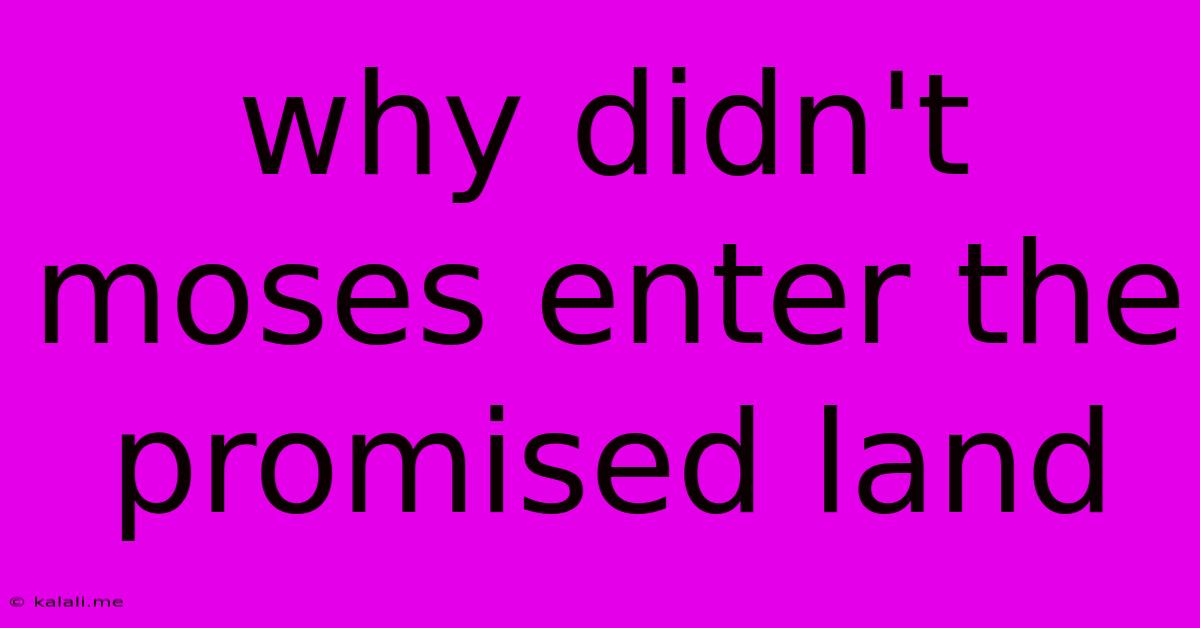Why Didn't Moses Enter The Promised Land
Kalali
Jun 01, 2025 · 4 min read

Table of Contents
Why Moses Never Entered the Promised Land: A Deeper Look at the Biblical Narrative
Moses, the iconic prophet who led the Israelites out of Egyptian slavery, is a central figure in the Old Testament. His story, however, ends tragically short of the Promised Land – a land flowing with milk and honey, promised by God to Abraham and his descendants. This article delves into the biblical accounts to explore the reasons behind Moses' exclusion from Canaan. The primary reasons, as revealed in the Book of Numbers, center around two key incidents: striking the rock at Meribah and a failure of trust in God's command.
The narrative of Moses and the Israelites' journey is replete with challenges, tests of faith, and instances of disobedience. It's within this context that the reasons for his exclusion from the Promised Land must be understood. Understanding this narrative requires a nuanced look at the biblical text and avoids simplistic interpretations.
The Incident at Meribah: A Test of Leadership and Faith
One pivotal event that contributed to Moses' exclusion is recounted in Numbers 20. The Israelites, facing a water shortage in the wilderness, grew impatient and rebellious. God instructed Moses to speak to the rock to bring forth water. However, in a moment of anger and frustration, Moses struck the rock twice instead of speaking to it, as commanded. This act, while seemingly minor, represented a profound lack of faith in God's ability to provide and a failure to trust in divine instruction. God's instructions were specific, and Moses’ deviation, fueled by his own impatience and potentially doubt, became a significant transgression. This act of disobedience is presented as a pivotal moment demonstrating a lack of faith that ultimately disqualifies Moses from the ultimate reward.
This incident highlights a crucial theme in the narrative: leadership under pressure. Moses, despite his remarkable achievements, demonstrated human fallibility. The act at Meribah revealed a flaw in his leadership, a failure to maintain faith and composure under duress. This wasn't merely a matter of technical disobedience; it was a symbolic act reflecting a deeper issue of faith and trust in God's providence. The narrative underscores that even the most devout leaders can falter and that true leadership requires unwavering faith and obedience, even in the face of adversity.
A Lack of Complete Trust and Obedience
Beyond the specific act at Meribah, a broader narrative of Moses' leadership reveals a consistent theme: the Israelites' repeated acts of rebellion and doubt, and Moses' sometimes imperfect response. While Moses acted as a mediator between God and the people, leading them with courage and dedication, he also encountered challenges in guiding a people prone to questioning and disobeying God. The repeated tests and trials throughout their journey served as tests not only for the Israelites but for Moses as well.
Moses' exclusion from the Promised Land can thus be seen not as a punishment for a single isolated event but as a consequence of a pattern of behavior. It’s a culmination of his leadership decisions and his response to the ongoing challenges of guiding a deeply flawed and rebellious community towards their destined goal. His actions, though stemming from human limitations and the pressures of his immense responsibility, ultimately fell short of the complete trust and unwavering obedience expected from a leader chosen by God.
Understanding the Significance of the Narrative
The story of Moses' exclusion serves as a cautionary tale, both for leaders and followers. It underscores the importance of unwavering faith, complete obedience, and the recognition of human limitations even in those chosen by God for great tasks. It reminds us that even those entrusted with significant responsibilities are held accountable for their actions, and their shortcomings can have lasting consequences.
Furthermore, the narrative highlights the complex relationship between divine will and human agency. God's plan for the Israelites' liberation and journey towards the Promised Land unfolded through the actions of flawed, imperfect humans, including Moses himself. This makes the story both profound and relatable, revealing the challenges and complexities of faith, leadership, and obedience in the face of immense trials and temptations. The exclusion of Moses, far from being a simple punishment, serves as a profound lesson about the human condition and the nature of faith.
Latest Posts
Latest Posts
-
How To Get Mold Off Grout
Jun 03, 2025
-
Xylophone Vs Marimba Vs Vibraphone Vs Glockenspiel
Jun 03, 2025
-
How To Stop Using The Sustain Pedal Too Much
Jun 03, 2025
-
Doing Multiple Data Transformations For Skewness
Jun 03, 2025
-
Can I Substitute Agave For Sugar In Choc Chip Cookies
Jun 03, 2025
Related Post
Thank you for visiting our website which covers about Why Didn't Moses Enter The Promised Land . We hope the information provided has been useful to you. Feel free to contact us if you have any questions or need further assistance. See you next time and don't miss to bookmark.